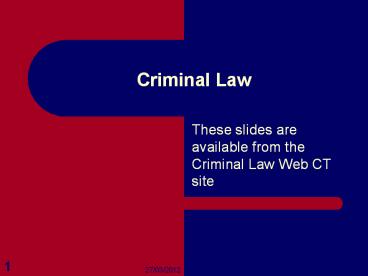Criminal Law PowerPoint PPT Presentation
1 / 12
Title: Criminal Law
1
Criminal Law
- These slides are available from the Criminal Law
Web CT site
2
Sources of the Criminal Law
- Where does the criminal law come from?
3
Sources Legislation
- Acts of the UK Parliament
- Acts of the Scottish Parliament
- Only after 1999
- Acts of the Parliaments of Scotland
- Prior to 1707
- Subordinate Legislation
4
Legislation as a source of criminal law
- Much of the criminal law is untouched by
legislation - Legislation is, however, important in some areas
- road traffic
- health and safety
- drugs
- firearms and other weapons
- some sexual offences
5
Human Rights
- Two Acts of Parliament of particular importance
- Human Rights Act 1998
- Scotland Act 1998
- Together they give effect to the rights set out
in the European Convention on Human Rights
6
The ECHR
- Protects a wide range of civil and political
rights - Right to life (art 2)
- Freedom from torture etc (art 3)
- Due process (arts 5 6)
- No retrospective criminality (art 7)
- Private and family life (art 8)
- Thought, conscience and religion (art 9)
- Freedom of expression (art 10)
- Freedom of association (art 11)
- Right to marry and found a family (art 12)
7
Human Rights
- Scottish Parliament cannot pass legislation which
is incompatible with ECHR - All legislation must be read and given effect in
a way that is compatible with ECHR - Lord Advocate, as head of the system of public
prosecution cannot act in a way that is
incompatible with ECHR - Essentially, the criminal law can only be
enforced to the extent that it is compatible with
ECHR
8
Where do we find rules of criminal law?
- Criminal law has become codified law. Everyplace
you go in the Western world, you will find a
criminal code that lays out the definitions of
offenses in the codes special part and
prescribes general principles of responsibility
in the codes general part. (Fletcher again,
Basic Concepts of Criminal Law (1998), 3). - Everyplace except Scotland (and the rest of the
UK and Ireland, in fact) - There is, however, an unofficial Draft Criminal
Code for Scotland (published in 2003).
9
Codification of the Criminal Law
- Draft Criminal Code for Scotland
- Part 1 General principles
- Part 2 Non-sexual offences against the person
- Part 3 Sexual Offences
- Part 4 Offences against property and economic
interests - Part 5 Offences involving extortion, deception
or dishonesty - Part 6 Offences against public order, safety and
security - Part 7 Offences against lawful government and
the administration of justice - Part 8 Offensive condcut
- Part 9 Offences involving animals
- Part 10 Rules on consent, interpretation etc.
- Schedule 1 Sentencing framework
10
Sources The Common Law
- Judge-made law
- Legal writings Institutional Writers
11
Judge-made law
- Rules of law developed by the courts
- But today the courts must develop the criminal
law in line with human rights - Common law offences often quite flexible
- H.M. Advocate v Wilson
- Courts will respond to changing social attitudes
- Stallard v H.M. Advocate
- The declaratory power of the High Court
- Bernard Greenhuff (1838)
12
Legal Writings
- Some legal writers are known as institutional
writers - Their views on the law are accorded particular
respect - If no statute or judicial decision
institutional writers opinions may be accepted
as determining the law - Brennan v H.M. Advocate
- But not always
- In criminal law, institutional status is given
to Baron David Humes Commentaries and to Sir
George Mackenzies Criminal Law

